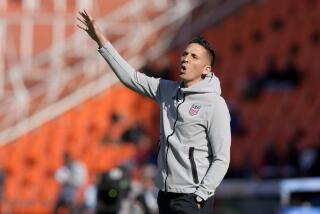A LOOK AT THE OTHER SPORTS...
- Share via
For the first time in 80 years, a U.S. water polo team had a legitimate chance to win an Olympic gold medal.
The 1984 team had experience--the majority of the players had been on the national team since the late 1970s. The team was playing at home. And the Soviets, who had won the previous world championships, were boycotting.
But although the U.S. did not lose a game, it lost the gold medal to Yugoslavia based on a goal differential. Still, it was the best U.S. water polo finish since 1904, when the Americans won the gold medal in an exhibition tournament not entered by foreign nations.
The U.S. team will be hard pressed in 1988 to equal the second-place finish. This team will be inexperienced--only three members from the 1984 team have committed to play in the Seoul Olympics. And it will have to face Russia and Hungary, a top-ranked team that also boycotted the Los Angeles Olympics.
‘No other top team lost the number of players that we have,” said Steve Heaston, assistant Olympic water polo coach. “We definitely have some catching up to do.”
The majority of the players on the U.S. national team graduated from college within the last two years, according to Bill Barnett, new Olympic head coach. The top European teams stayed intact after the Olympics and have been playing together for years. In order to close the experience gap, the U.S. team has spent a total of almost two months overseas this season, training with other teams and playing in tournaments, Barnett said.
“The game is played by Europeans and refereed by Europeans,” he said. “We have to spend as much time as we can over there.”
Barnett, 42, is considered the Vince Lombardi of high school water polo. He has won 10 CIF championships during his 18 years at Newport Harbor High School and is known as a volatile martinet who brooks no backtalk from players or parents.
Barnett, past coach of the U.S. junior national team and senior “B” team, has had some early success with the young U.S. team. In a major international tournament several months ago, the U.S. placed second behind West Germany. Although the Soviets and Hungarians did not play, the finish was still an accomplishment for a team so inexperienced.
“We were down three or four goals in several games, but we were able to come back and win,” said driver Kevin Robertson. “That’s a credit to the new coaching staff. They were able to make changes and adjustments as the game progressed.
Terry Schroeder, considered one of the best two-meter men in the world, was one of the top scorers in the Olympics. All the action in the pool revolves around the two-meter man, Heaston said, so Schroeder’s return was crucial for the U.S. team.
“Terry is the rock of the team; our 1988 team will be built around him,” Heaston said. “He’s a dominating player and he’s getting even better offensively.”
Schroeder, a chiropractic student; Robertson, a bank loan officer, and defenseman Peter Campbell, a student, are the only Olympians who still are competing with the national team. The new national team players are talented, Barnett said, and just need some seasoning. Driver Alan Gresham, the fastest member of the team, and Alan Mouchawar, a versatile player who excels both offensively and defensively, have played extremely well during recent tours.
The early gold medal contenders for the 1988 Olympics are the Soviets and the Yugoslavs, Heaston said. The Soviets won the 1980 Olympics and dominated every major tournament for the next four years. They were favored to win the gold medal in the last Olympics, before the boycott. And the Yugoslavs won the gold medal in Los Angeles with a young team, average age 23. They can only get better.
More to Read
Go beyond the scoreboard
Get the latest on L.A.'s teams in the daily Sports Report newsletter.
You may occasionally receive promotional content from the Los Angeles Times.






